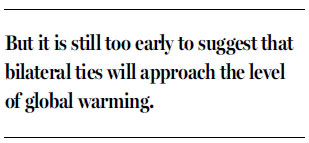
This trend has been worrying Japanese business leaders, and with ties between the countries beginning to thaw, they seem eager to fly to China to explore new avenues.
Led by the ruling Liberal Democratic Party's senior leader Toshihiro Nikai, some 3,000 people from Japan's tourism and other business sectors, as well as officials from local governments and cultural bodies, visited China in May. Their aim was to seek opportunities to capitalize on the rising number of Chinese traveling abroad each year because of their increasing incomes and the easing restrictions on foreign travel.
For the first time, the Japan-China Economic Association, Keidanren (Japan Business Federation) and the Japan Chamber of Commerce and Industry jointly sent 220 business heavyweights to Beijing early this month.
Some Japanese companies have joined Chinese enterprises in China's new Silk Road projects in inner Asia and the Indo-Pacific littoral, which has been termed Belt and Road Initiative.
Abenomics, Japanese Prime Minister Shinzo Abe's economic policy, features massive injections of cash into the country's economy by Japan's central bank, depressing the value of the yen. This, in turn, has produced a windfall for corporate Japan because the falling value of the yen means that overseas profits will increase when translated into the Japanese currency.
While Japanese enterprises are eager to jump on the Belt and Road Initiative bandwagon, their government, siding with the United States, has been giving the cold shoulder to China's economic projects.
In a recent op-ed article in The New York Times, Yoichi Funabashi, chairman of Tokyo-based think tank Rebuild Japan Initiative Foundation, said Japan should join the China-led Asian Infrastructure Investment Bank. "By distributing financial assistance to states in the Asia-Pacific, the bank will inevitably help shape the region's future economic architecture, as well as, implicitly, its security relations," he wrote. "Japan has a major strategic interest in participating."
There are tangible signs of progress in China-Japan relations, and business leaders of the two countries are committed to keeping their dialogue going. But it is still too early to suggest that bilateral ties will approach the level of global warming.
The author is China Daily's Tokyo bureau chief.

I’ve lived in China for quite a considerable time including my graduate school years, travelled and worked in a few cities and still choose my destination taking into consideration the density of smog or PM2.5 particulate matter in the region.